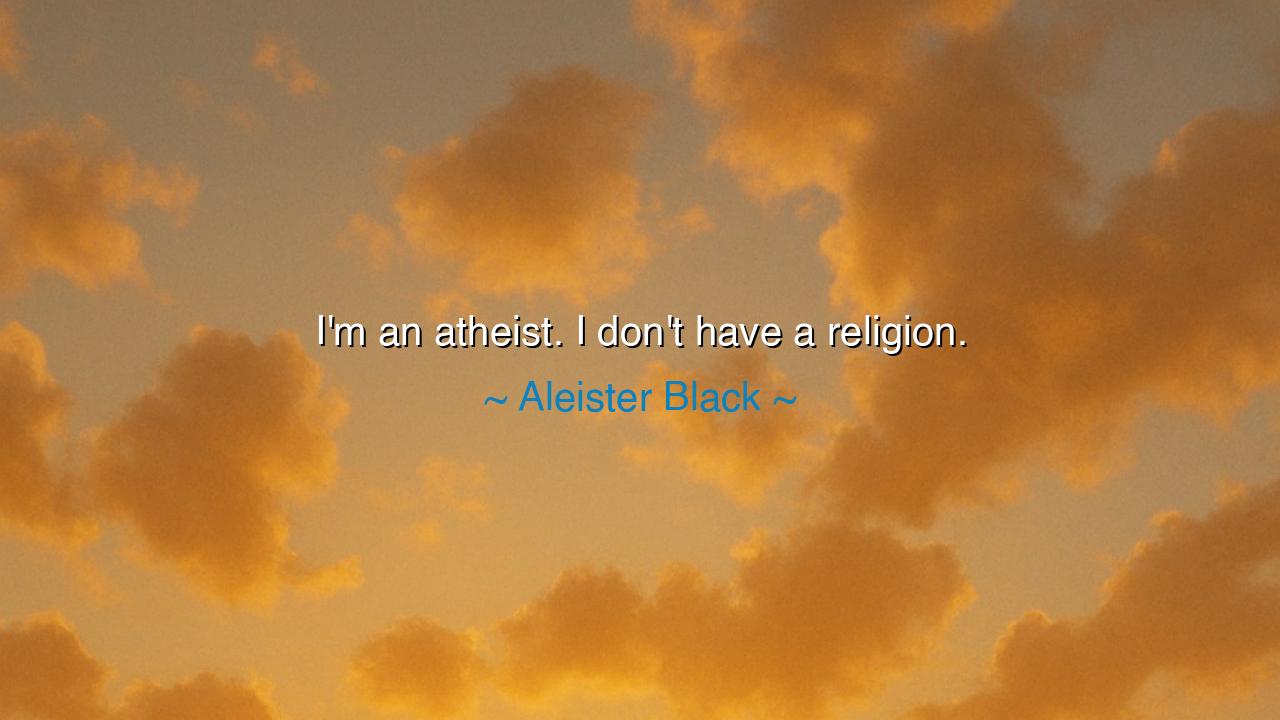
I'm an atheist. I don't have a religion.






"I'm an atheist. I don't have a religion." – Aleister Black.
In these words, Aleister Black expresses a declaration that has echoed through the halls of human history: a rejection of the established structures of religion and belief. His statement, though simple, encapsulates a complex worldview—one in which faith, in the conventional sense, is not seen as a guiding force. Atheism, in this context, is not merely an intellectual position; it is a rejection of external authority, a choice to forge one’s own path without relying on the doctrines of traditional religion. Black’s statement represents a freedom that many in history have sought: the freedom to question, to doubt, and to find meaning outside the bounds of institutionalized faith.
The ancients, too, grappled with questions of belief and existence. In the time of Socrates, the question of the gods was one that stirred much debate. Socrates himself was accused of impiety—of not believing in the gods of Athens—because he questioned the accepted religious teachings of his day. He sought knowledge through reason rather than through divine revelation, asserting that true wisdom comes from self-examination and critical thought. To Socrates, understanding the nature of existence and truth did not require adherence to established religions, but a deep, personal engagement with the world through reason and virtue.
Likewise, the Stoics, such as Epictetus and Marcus Aurelius, believed that one could live a life of moral excellence and contentment without relying on supernatural forces. Marcus Aurelius, the Roman Emperor and Stoic philosopher, was deeply concerned with the inner workings of the human soul, emphasizing the importance of self-control, virtue, and wisdom as the true sources of happiness. His beliefs were not rooted in religious rituals but in rationality and the cultivation of inner peace. In this sense, the Stoic philosophy aligns closely with atheism, as both emphasize personal responsibility and understanding over external religious frameworks.
The Renaissance brought a rebirth of human thought, a shift that moved away from the dogmatic religious teachings of the Middle Ages and embraced a rational and scientific worldview. Think of figures like Galileo Galilei, whose groundbreaking work in astronomy challenged the religious views of the time. Galileo’s conflict with the Church is a striking example of how the conflict between reason and religion played out. Galileo’s discoveries did not align with the biblical teachings of his era, and he faced tremendous backlash for suggesting that the earth revolved around the sun. Galileo’s story is a reflection of the struggle to seek truth through science and logic, rather than religious doctrine.
Consider the life of Richard Dawkins, the biologist and prominent atheist who has spent much of his career advocating for secularism and the scientific method as the guiding forces in human understanding. Dawkins’s works, such as The God Delusion, criticize religion for its reliance on faith and its avoidance of rational inquiry. His stance is not just a denial of belief in a deity but an affirmation of the human capacity to find meaning in the world without supernatural explanations. In a similar way, Aleister Black's rejection of religion is an embrace of personal agency and empirical understanding over prescribed doctrines.
However, it is important to note that atheism does not merely reject religion but also embraces a profound responsibility. To live without the framework of religion is to live with the knowledge that meaning is created, not inherited. The moral framework for an atheist is built not on divine commandments, but on the principles of rational thought, ethics, and the consequences of actions. In this sense, atheism can be seen as a call to responsibility—to make choices that reflect the human condition without deferring to external, supernatural justifications.
The lesson we can draw from Black’s statement and the philosophical tradition of atheism is one of self-determination and critical thinking. We are all faced with the question of what gives our lives meaning—whether through religious belief or rational understanding. Faith can offer comfort, but so too can a life led by reason, reflection, and action. Whether you hold religious beliefs or choose to follow the path of atheism, the essence of the human journey is in the choices we make, the responsibility we take for our lives, and the impact we have on the world around us.
In our own lives, we must be fearless in our search for truth, unafraid to question what we have been taught or what we have inherited. Just as Socrates urged his followers to examine their lives, we must examine our beliefs, our actions, and our place in the world. Whether through the lens of atheism, religion, or philosophy, we must seek to live authentically and with purpose, grounded in reason and human connection. In doing so, we will find meaning not in the answers given to us, but in the questions we dare to ask.






AAdministratorAdministrator
Welcome, honored guests. Please leave a comment, we will respond soon